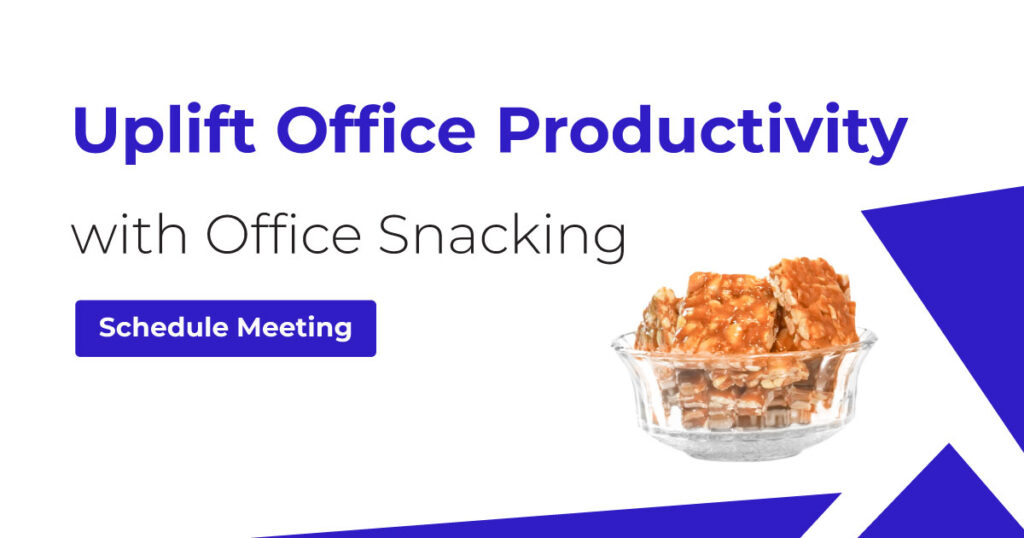What is Office Snacking?
Office snacking refers to the practice of offering employees convenient and healthy snack options throughout their workday. This practice is becoming increasingly popular in modern workplaces as a way to support employee well-being and productivity. Rather than just being a simple way or a way to satisfy mid-day hunger, office snacking is seen as a strategic initiative. By providing snacks like fruits, nuts, granola bars, and millet snacks, companies aim to help employees maintain their energy levels and stay focused on their tasks. The availability of healthy snacks can prevent the energy slumps that often occur during long work hours, reducing the need for extended breaks and helping employees remain engaged and productive throughout the day.
Purpose and Benefits:
- Boosts Energy Levels: Healthy snacks prevent energy slumps, keeping employees alert.
- Enhances Focus: Regular snacking helps maintain concentration and reduces distractions.
- Improves Mood: Nutrient-rich snacks can enhance mood, reducing stress and promoting a positive work environment.
- Promotes Well-being: Access to healthy snacks encourages better eating habits, leading to overall health improvement.
- Increases Employee Satisfaction: Providing snacks is a simple yet effective way to show care for employees’ well-being, leading to higher satisfaction and loyalty.
Common Snack Options:
- Fruits: Fresh options like apples, bananas, and berries provide natural sugars and essential vitamins.
- Nuts: Almonds, walnuts, and other nuts offer protein and healthy fats, keeping employees satiated longer.
- Granola Bars: A quick, portable snack that combines fiber, protein, and carbohydrates for sustained energy.
- Millet Snacks: A nutritious, gluten-free option rich in fiber and minerals, promoting overall health.
Strategic Value:
- Employee Engagement: Regular access to snacks can enhance overall job satisfaction and engagement.
- Health Promotion: Encourages healthier eating habits, reducing reliance on unhealthy, processed foods.
- Productivity Enhancement: By reducing energy dips, snacks help employees maintain steady performance levels throughout the day.

What is The Cost Hurdle in Providing Office Snacks?
While the advantages of office snacking are clear, the costs associated with providing regular, high-quality snacks can be a significant challenge for many companies. These costs encompass various aspects, from initial setup expenses to ongoing operational outlays.
Initial Costs:
- Purchasing: Companies must invest in a variety of snacks that cater to diverse dietary needs and preferences, which can be costly.
- Storage: Ensuring that snacks remain fresh and easily accessible requires proper storage solutions, adding to the overall expense.
- Supply Management: Setting up a system to maintain a consistent supply of snacks requires logistical planning and resources, further contributing to initial costs.
Ongoing Expenses:
- Regular Replenishment: Snacks need to be regularly restocked, leading to continuous operational costs that can accumulate over time.
- Quality Maintenance: Providing premium, healthy snack options instead of cheaper, less nutritious alternatives increases ongoing expenses.
- Administrative Overhead: Managing the snack program, including inventory tracking and supplier coordination, adds to the ongoing costs.
Budget Constraints:
- Limited Resources: Smaller companies or those with tight budgets may find it difficult to allocate sufficient funds for a robust snack program.
- Priority Decisions: For some businesses, especially those focused on core operations, spending on employee amenities like snacks might be deprioritized, making it harder to justify the expense.
- Cost-Benefit Analysis: Companies must carefully weigh the costs against the perceived benefits, leading to tough decisions about whether the investment in office snacking is sustainable.
Evaluating the ROI of Office Snacking:
Despite the initial costs, offering office snacks can yield a significant return on investment (ROI) for companies. The key is to strike a balance between the expenses involved and the productivity gains, improved employee retention, and overall well-being that result from providing these snacks. Here’s a closer look at how the benefits of office snacking can far outweigh the costs:
Enhanced Productivity:
- Providing healthy snacks can keep employees energized throughout the day, leading to fewer energy slumps and less frequent breaks.
- This sustained energy translates into more focused and productive work hours, allowing employees to accomplish tasks more efficiently and with higher quality.
- By minimizing distractions caused by hunger or low energy, snacks can help maintain momentum and improve overall output.
Reduced Absenteeism:
- Healthier eating habits, supported by access to nutritious snacks, contribute to better overall health and a stronger immune system.
- When employees are healthier, they are less likely to take sick days, which directly impacts the company’s bottom line by reducing the costs associated with absenteeism.
- Fewer sick days also mean more consistent work performance, ensuring projects stay on track and deadlines are met.
Increased Employee Retention:
- Employees who feel valued and cared for are more likely to stay with the company long-term. Providing snacks is a simple but effective way to show that the company cares about their well-being.
- This gesture of appreciation can boost morale and job satisfaction, leading to lower turnover rates.
- By reducing turnover, the company saves on the costs associated with recruiting, hiring, and training new employees, which can be substantial over time.
Positive Work Culture:
- Offering snacks can create a more positive and collaborative work environment. When employees gather around the snack area, it creates informal interactions and strengthens team bonds.
- A more connected and engaged workforce is typically more productive and innovative, as employees feel comfortable sharing ideas and working together towards common goals.
- This positive work culture not only boosts morale but also enhances overall workplace efficiency and effectiveness.
Cost-Effective Investment:
- While there are clear costs involved in providing snacks, the benefits often outweigh these expenses. The productivity improvements, reduced absenteeism, and higher employee retention all contribute to a healthier bottom line for the company.
- In essence, the investment in snacks can pay for itself by driving business success and fostering a happier, healthier workforce.
- For companies looking to make a tangible difference in their employees’ lives, investing in office snacking is a smart and strategic move that offers both immediate and long-term returns.




